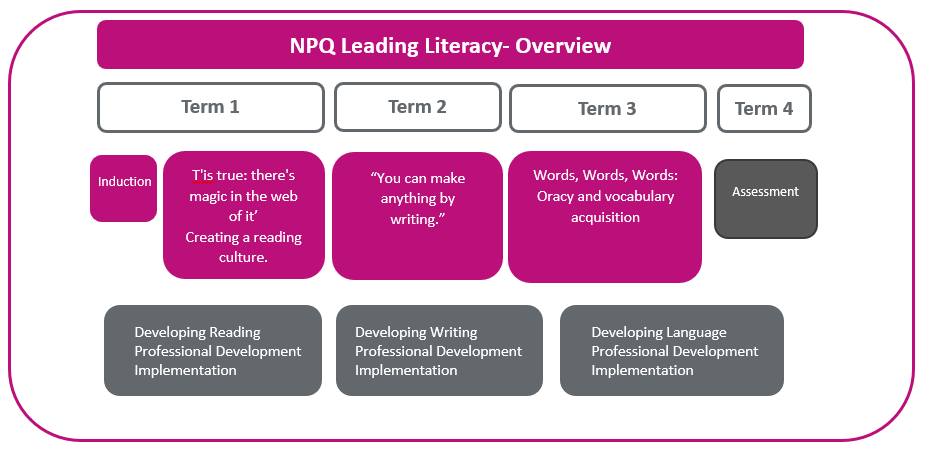- Home
- Our NPQ Programmes
- NPQLL - Leading Literacy
NPQLL - Leading Literacy
Apply Now (with National Institute of Teaching)
Register Interest (with National Institute of Teaching)
Those leading literacy have the potential to cultivate a lifelong love of reading which will create opportunity and influence future life chances for children.
Leading literacy teaching is complex. Literacy leaders often contribute to strategic school development, develop and lead a team of teachers, and their work is focused on supporting effective teaching of literacy across the school. Literacy leaders need to have a deep understanding of the fundamental importance of literacy and recognise the influence it has on pupils’ future academic achievement, wellbeing and success in life. An excellent literacy leader will have expertise across a number of specialist areas related to their role (e.g. developing pupils’ spoken language) and a passion for literature that they want to share with the school community.
The National Professional Qualification for Leading Literacy (NPQLL) is aimed at teachers who have, or aspire to have, responsibilities for leading literacy across a school, year group, key stage or phase. They are normally part of the middle or senior leadership team.
Programme Information
Our delivery model is grounded in tried-and-tested evidence of effective school improvement from both the UK and US. The programmes are underpinned by theory, mapped for progression across all qualification levels, and application of learning prioritised to facilitate successful implementation.

Programme Model
The programme will use ‘see it, name it, do it’ as an organisational structure for scaffolding learning to the point of mastery. The model is a highly applied and personalised approach coined by the internationally renowned Leverage Leadership Institute.
- See it: The approach goes beyond theory by using current, real-life models of exemplary practice
- Name it: By identifying features of exemplary practice, the invisible is made visible. Participants reflect on their current practice and name their ‘gaps’
- Do it: Participants are guided through implementation planning with time for practice, peer feedback and the use of gap tasks. As part of formative assessment, participants then ‘fix their gaps’ by applying their learning in school.
Embedded assessment practice
Opportunities to ‘do it’, through practice and planning give the best chance of successful implementation and lead to rapid school improvement. Application of learning provides regular practice opportunities for final scenario-based assessment.
Blended learning
The programme is made up of a blend of synchronous and asynchronous components totalling a maximum of four days plus self study.
|
Element |
Synchronous |
Asynchronous |
|
|
Live facilitated |
Expert Support |
Self-study |
|
|
Units |
12 x 2hr sessions |
Flexible |
18 x 2hr units |
|
Hours |
24 Minimum of 8 hours in-person |
2 |
36 |
*Synchronous live facilitated sessions are designed in two-hour blocks that may be combined as whole days lasting six hours or delivered as a series of two-hour twilights.
Key Information
- Cost: £850 per participant (scholarship funding available for most participants)
- Scholarship funding available - click here for more information
- Programme length: 12 months
- Start date: October 2022
- Assessment : An open-book assessment in an eight-day set window within 3 months of completion requiring a structured 1500-word response to a real multi-resource scenario/case-study.
